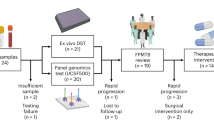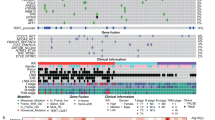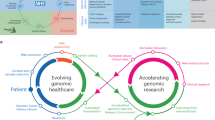Abstract
Background:
Organ confined prostate cancer (PCa) can be cured by radical retropubic prostatectomy (RRP); however, some tumors will still recur. Current tools fail to identify patients at risk of recurrence. Glutathione-S-transferases (GSTs) are involved in the metabolism of carcinogens, hormones and drugs. Thus, genetic polymorphisms that modify the GST activities may modify the risk of PCa recurrence.
Methods:
We retrospectively recruited Argentine PCa patients treated with RRP to study the association between GST polymorphisms and PCa biochemical relapse after RRP. We genotyped germline DNA in 105 patients for: GSTP1 c.313A>G (p.105 Ile>Val, rs1695) by PCR-RFLP; and GSTT1 null and GSTM1 null polymorphisms by multiplex PCR. Kaplan–Meier curves and Cox proportional hazard models were used to evaluate these associations.
Results:
Patients with GSTP1 c.313GG genotype showed shorter biochemical relapse-free survival (BRFS) (P=0.003) and higher risk for recurrence in unadjusted (Hazard ratio (HR)=3.16, 95% confidence interval (95% CI)=1.41–7.06, P=0.005) and multivariate models (HR=3.01, 95% CI=1.13–8.02, P=0.028). We did not find significant associations for GSTT1 and GSTM1 genotypes. In addition, we found shorter BRFS (P=0.010) and increased risk for recurrence for patients having two or more risk alleles when we combined the genotypes of the three GSTs in multivariate models (HR=3.06, 95% CI=1.20–7.80, P=0.019).
Conclusions:
Our results give support to the implementation of GSTs genotyping for personalized therapies as a novel alternative for PCa management for patients who undergo RRP. To the best of our knowledge, this is the first study that examined GST polymorphisms in PCa progression in Argentine men. Replication of our findings in larger cohort is warranted.
This is a preview of subscription content, access via your institution
Access options
Subscribe to this journal
Receive 4 print issues and online access
$259.00 per year
only $64.75 per issue
Buy this article
- Purchase on Springer Link
- Instant access to full article PDF
Prices may be subject to local taxes which are calculated during checkout




Similar content being viewed by others
References
Jemal A, Bray F, Center MM, Ferlay J, Ward E, Forman D . Global cancer statistics. CA Cancer J Clin 2011; 61: 69–90.
Matos EL, Loria DI, Zengarini N, Fernandez MM, Guevel CG, Marconi E et al Atlas de mortalidad por cáncer en Argentina 1997–2001. Asociación Argentina de Cáncer: Buenos Aires, 2003.
D’Amico AV, Whittington R, Malkowicz SB, Schultz D, Blank K, Broderick GA et al. Biochemical outcome after radical prostatectomy, external beam radiation therapy, or interstitial radiation therapy for clinically localized prostate cancer. JAMA 1998; 280: 969–974.
Kattan MW, Wheeler TM, Scardino PT . Postoperative nomogram for disease recurrence after radical prostatectomy for prostate cancer. J Clin Oncol 1999; 17: 1499–1507.
Ramos CG, Roehl KA, Antenor JA, Humphrey PA, Catalona WJ . Percent carcinoma in prostatectomy specimen is associated with risk of recurrence after radical prostatectomy in patients with pathologically organ confined prostate cancer. J Urol 2004; 172: 137–140.
Hayes JD, Flanagan JU, Jowsey IR . Glutathione transferases. Annu Rev Pharmacol Toxicol 2005; 45: 51–88.
Di Paolo OA, Teitel CH, Nowell S, Coles BF, Kadlubar FF . Expression of cytochromes P450 and glutathione S-transferases in human prostate, and the potential for activation of heterocyclic amine carcinogens via acetyl-coA-, PAPS- and ATP-dependent pathways. Int J Cancer 2005; 117: 8–13.
Mo Z, Gao Y, Cao Y, Gao F, Jian L . An updating meta-analysis of the GSTM1, GSTT1, and GSTP1 polymorphisms and prostate cancer: a HuGE review. Prostate 2009; 69: 662–688.
Ntais C, Polycarpou A, Ioannidis JP . Association of GSTM1, GSTT1, and GSTP1 gene polymorphisms with the risk of prostate cancer: a meta-analysis. Cancer Epidemiol Biomarkers Prev 2005; 14: 176–181.
Nock NL, Bock C, Neslund-Dudas C, Beebe-Dimmer J, Rundle A, Tang D et al. Polymorphisms in glutathione S-transferase genes increase risk of prostate cancer biochemical recurrence differentially by ethnicity and disease severity. Cancer Causes Control 2009; 20: 1915–1926.
Agalliu I, Lin DW, Salinas CA, Feng Z, Stanford JL . Polymorphisms in the glutathione S-transferase M1, T1, and P1 genes and prostate cancer prognosis. Prostate 2006; 66: 1535–1541.
Norskov MS, Frikke-Schmidt R, Bojesen SE, Nordestgaard BG, Loft S, Tybjaerg-Hansen A . Copy number variation in glutathione-S-transferase T1 and M1 predicts incidence and 5-year survival from prostate and bladder cancer, and incidence of corpus uteri cancer in the general population. Pharmacogenomics J 2011; 11: 292–299.
Acevedo C, Opazo JL, Huidobro C, Cabezas J, Iturrieta J, Quinones Sepulveda L . Positive correlation between single or combined genotypes of CYP1A1 and GSTM1 in relation to prostate cancer in Chilean people. Prostate 2003; 57: 111–117.
Caceres DD, Iturrieta J, Acevedo C, Huidobro C, Varela N, Quinones L . Relationship among metabolizing genes, smoking and alcohol used as modifier factors on prostate cancer risk: exploring some gene-gene and gene-environment interactions. Eur J Epidemiol 2005; 20: 79–88.
Avena S, Via M, Ziv E, Perez-Stable EJ, Gignoux CR, Dejean C et al. Heterogeneity in genetic admixture across different regions of Argentina. PLoS ONE 2012; 7: e34695.
Corcoran NM, Hovens CM, Metcalfe C, Hong MK, Pedersen J, Casey RG et al. Positive surgical margins are a risk factor for significant biochemical recurrence only in intermediate-risk disease. BJU Int 2012; 110: 821–827.
Srivastava SK, Singhal SS, Hu X, Awasthi YC, Zimniak P, Singh SV . Differential catalytic efficiency of allelic variants of human glutathione S-transferase Pi in catalyzing the glutathione conjugation of thiotepa. Arch Biochem Biophys 1999; 366: 89–94.
Bastian PJ, Palapattu GS, Lin X, Yegnasubramanian S, Mangold LA, Trock B et al. Preoperative serum DNA GSTP1 CpG island hypermethylation and the risk of early prostate-specific antigen recurrence following radical prostatectomy. Clin Cancer Res 2005; 11: 4037–4043.
Block G, Shaikh N, Jensen CD, Volberg V, Holland N . Serum vitamin C and other biomarkers differ by genotype of phase 2 enzyme genes GSTM1 and GSTT1. Am J Clin Nutr 2011; 94: 929–937.
To-Figueras J, Gene M, Gomez-Catalan J, Pique E, Borrego N, Carrasco JL et al. Genetic polymorphism of glutathione S-transferase P1 gene and lung cancer risk. Cancer Causes Control 1999; 10: 65–70.
Ladero JM, Martinez C, Garcia-Martin E, Ropero P, Briceno O, Villegas A et al. Glutathione S-transferase M1 and T1 genetic polymorphisms are not related to the risk of hepatocellular carcinoma: a study in the Spanish population. Eur J Cancer 2006; 42: 73–77.
Raimondi S, Paracchini V, Autrup H, Barros-Dios JM, Benhamou S, Boffetta P et al. Meta- and pooled analysis of GSTT1 and lung cancer: a HuGE-GSEC review. Am J Epidemiol 2006; 164: 1027–1042.
Agudo A, Peluso M, Sala N, Capella G, Munnia A, Piro S et al. Aromatic DNA adducts and polymorphisms in metabolic genes in healthy adults: findings from the EPIC-Spain cohort. Carcinogenesis 2009; 30: 968–976.
Acknowledgements
We acknowledge Diego Fernandez-Ortiz for his help with the clinical records. This work was financially supported by Agencia Nacional de Promoción Científica y Tecnológica: PICT 2006-0228 and PICT-RAICES 2006-0367. National Center for Research Resources and the National Center for Advancing Translational Sciences, National Institute of Health (NIH), through Grant Award Number TL1RR031992.
Author information
Authors and Affiliations
Corresponding author
Ethics declarations
Competing interests
The authors declare no conflict of interest.
Additional information
Supplementary Information accompanies the paper on the Prostate Cancer and Prostatic Diseases website
Supplementary information
Rights and permissions
About this article
Cite this article
Cotignola, J., Leonardi, D., Shahabi, A. et al. Glutathione-S-transferase (GST) polymorphisms are associated with relapse after radical prostatectomy. Prostate Cancer Prostatic Dis 16, 28–34 (2013). https://doi.org/10.1038/pcan.2012.45
Received:
Revised:
Accepted:
Published:
Issue Date:
DOI: https://doi.org/10.1038/pcan.2012.45



